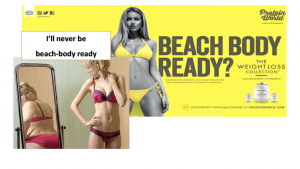Welcome to UBC Blogs. This is your first post. Edit or delete it, then start blogging!
Monthly Archives: February 2018
GRSJ300 Beach Body Jam

The ad I selected in by Protein World, a shady, online-based company which features weight loss and other “health” products. The “Weight Loss Collection” they are advertising contains a product called “The Slender” and in the small print under the big writing it says that in order to lose weight, you need to be “substituting two daily meals of an energy restricted diet with a meal replacement.” This means that the ad is encouraging women to starve themselves, substituting two healthy meals, which usually have to be around 500-600 calories, with a protein shake which is usually under 300 calories. What this ad is advertising is what is better known as “crash-dieting,” in which you shock the body by basically putting it into starvation mode. This type of dieting is not sustainable so most people only keep it up for 4 to 6 weeks max, which is why the advertising is putting it in such an urgency-implied wording that you need to be “beach-body ready” by a certain time. The problem with crash-dieting is that most people aren’t able to keep it up for long, and the results don’t last, as the starved body aims to return to a state of normalcy so, most people end up putting on more weight than they previously had. Besides advertising crash dieting as a desirable thing to do, the ad also uses body shaming, to say that if you are not “beach body” ready, then you shouldn’t go to the beach; you should be ashamed of yourself and stay at home or don’t go out in public. Therefore, any woman looking at herself, maybe at her stretch-marked body due to pregnancy or age, being slightly overweight, or disabled, will feel worse about themselves and yet there is nothing a protein shake can fix. By showing a very young looking, maybe late-teens model, the advertisers are also aiming this at very young women, who are already struggling in a world in which they are constantly assaulted with unrealistic body images.

In my deconstructed ad, I wanted to show the most injurious effects of going on crash-diets or committing to a life of dieting, something women do all the time. The dieting industry is enormous, and it is fueled by ads like this one, which use young, well-proportioned, usually tall models, and then apply Photoshop techniques to make the image perfect in order to create a fantasy to which women will want to aspire. Normal, everyday women don’t look like that, and they can’t fix their problems with going on a crash diet. As a mother with two daughters, I am very worried about the message this type of advertising delivers. I also realize that even though I am in my twenties, my body will never be what it used to be, regardless of how much I diet. However, these ads are not meant to offer solutions; they are just meant to make women feel inadequate, not pretty enough, not skinny enough, and then it implies that being anything less than perfect requires hiding yourself. I am trying to show that the way we see ourselves is often determined by our being constantly bombarded with such images which imply that there is a solution to our imperfect bodies. Therefore, if there is a simple solution – Go on a diet! – then it’s only a matter of being lazy if we don’t achieve this level of body perfection. This type of ad makes young women starve themselves, causes body image dissatisfaction, enforces gender roles which require physical perfection and “girlyness,” and can cause eating disorders like anorexia and bulimia. Going to the beach usually reveals how wrong these advertisements are, as people don’t look like this and there shouldn’t be any requirements for women to meet before they allow themselves to appear in a bathing suit.